Have you ever considered switching up your morning oatmeal routine with something a bit more traditional?
Old-Fashioned oats are the perfect place to start when it comes to changing up your breakfast.
From cookies and bars to quick breakfasts and hot cereals, they provide an addictively chewy texture when cooked, making them a favorite among many.
But what are the best substitutes for Old-Fashioned Oats if you demand variety?
Fortunately, there are plenty of alternatives, some that you might already keep in your pantry.
Each variety provides its own unique texture and flavor profile so experiment with each one to find the most suitable for whatever dish you’re creating.
What are Old-Fashioned Oats?

Old-fashioned oats, also known as rolled oats or oat groats, are made by flattening oat grains with high pressure rollers and then lightly steaming them.
The result is an oat flake that contains more of the whole grain than other processed forms, offering a chewier texture and nuttier flavor.
These oats are ready to eat in about 10 minutes once cooked with boiling water.
Old-fashioned oats are a great source of both soluble and insoluble fiber, helping control blood sugar levels, promote digestion and keep you feeling fuller for longer.
They can also act as a substitute for breadcrumbs in recipes such as meatballs.
Overnight oats is another popular recipe where you soak the flakes in milk (dairy or plant-based) to soften overnight for a kickstart breakfast option.
The 5 Best Substitutes for Old Fashioned Oats
Old fashioned oats are the most popular type of oat for general use in recipes, but not everyone has them available or prefers the texture.
Luckily, there are plenty of alternatives that you can use instead.
Here is a list of five popular substitutes for old-fashioned oats with some information to help you decide which one to use.
1 – Quinoa Flakes
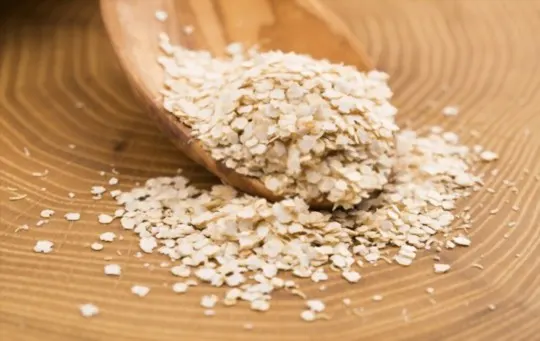
Quinoa flakes are a gluten-free alternative to old-fashioned oats, making them a suitable choice for people with celiac disease or gluten sensitivities.
Quinoa is also an excellent source of plant-based protein; one cup of quinoa flakes contains 8 grams of protein, about half the protein found in one cup of old-fashioned oats.
It also boasts 4 grams of fiber and is much higher in calcium than old-fashioned oats.
Quinoa flakes tend to cook more quickly than rolled oats and can be added to smoothies, baked goods and cereal or used as a good vegan binder in recipes like veggie burgers.
2 – Buckwheat
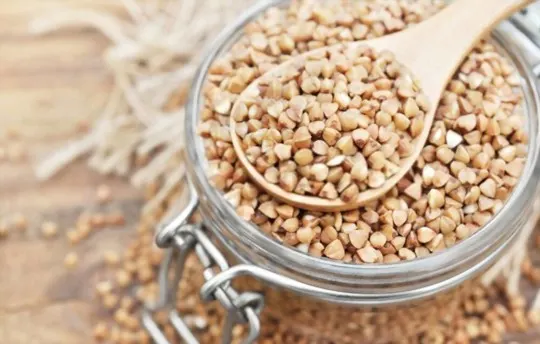
Buckwheat is an incredibly versatile grain and makes a great addition to porridge; however, it’s not necessarily a one-for-one substitute for old-fashioned oats.
While conventional oatmeal tends to provide mostly carbohydrates, buckwheat instead provides a mix of carbohydrates and moderate amounts of protein and fats.
Additionally, in comparison to oats, buckwheat provides some additional vitamins, minerals and dietary fiber.
On its own, raw buckwheat has an earthy nutty flavor while cooked buckwheat has a slightly chewy texture that can be used in any number of recipes or as provided here in this oatmeal option.
It’s also gluten-free so individuals with Celiac Disease or gluten sensitivity may find it more suitable when looking for the best alternative for traditional oats.
To prepare buckwheat in your porridge recipe use the same measure of cooking liquid as you would for old fashioned oats – replace 1 cup of old fashioned oats with 1 cup of coarsely ground or crushed raw buckwheat groats (kasha).
Boil for about 10 minutes before adding other ingredients such as sweeteners or honey and your favorite fruits like apples or peaches before serving.
If you find that you need extra cooking time just increase the water accordingly as needed.
3 – Steel-cut Oats
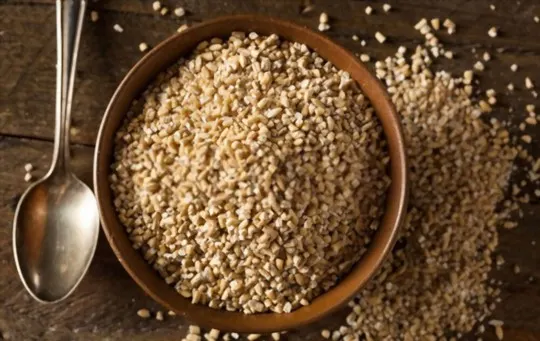
Steel-cut oats, also known as Irish or pinhead oats, have been cut into two to three pieces with steel blades.
This process produces a chewier and nuttier substance than rolled oats.
Although they require more time to cook than rolled oats (typically 15-20 minutes or longer), steel-cut oats are not as processed, giving them a higher fiber content and a slightly lower glycemic index than other oat types.
Steel cut oatmeal is best used in recipes that require a coarser texture – like porridge – but can also be used for overnight oats that add some more texture the next day.
For best results, use the ratio of steel-cut to liquid as suggested on the package directions.
4 – Amaranth
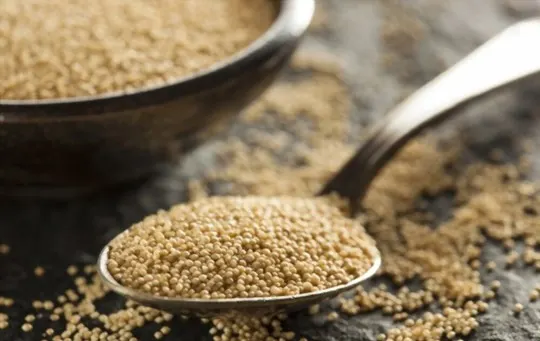
Amaranth is a healthy and nutritious grain alternative to old-fashioned oats.
It has a nutty, sweet flavor and is an excellent source of protein, dietary fiber, and manganese#.
Amaranth also has more calcium than many other grains and is rich in iron, zinc, vitamins B6 and E as well as selenium.
Amaranth is best enjoyed when soaked overnight — this helps to soften it up — then you can simply use the liquid to cook it just like you would old-fashioned oats.
It will take roughly 10 minutes on the stovetop or with a pressure cooker.
Amaranth can be prepared the same way as oatmeal but can also be used in breads, porridges, cereals, soups and even cake recipes.
Additionally, amaranth flakes can substitute for rolled oats in granola bars or muesli for an extra boost of nutrition.
5 – Millet
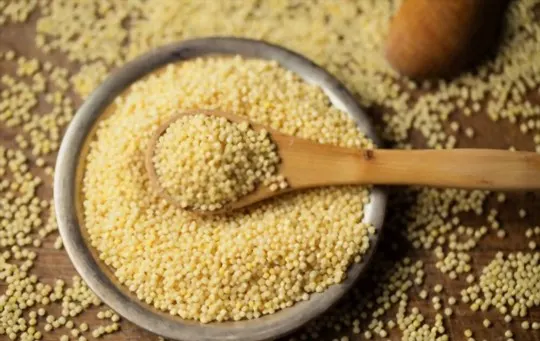
Millet is small, yellow grain that is often used in breeding mixtures for small birds.
Although millet may not be a traditional choice as a substitute for old-fashioned oats, it does have some similar properties and advantages that make it an option to consider.
Millet is gluten-free, which is suitable for those who strictly follow a gluten-free diet.
Additionally, Millet grains are rich in protein and vitamins, and provide dietary fiber to promote better digestion.
Millet can be swapped one-to-one with oats like other substitutions on this list.
It can be used in baking or boiled as part of breakfast porridges or salads as part of lunch and dinner dishes as well as included in granolas or muesli for a variety of meal options throughout the day.
Conclusion
In conclusion, Old-fashioned oats are a type of oats that have been rolled and flattened so that they cook faster.
They have a nutty flavor and chewy texture which makes them perfect for baking and overnight oats.
Due to their large size, they require longer cooking times than instant, quick or steel-cut oats.
If old-fashioned oats are unavailable in your area, you can look for rolled oats, whole grain flake cereals or crushed bran flakes as possible substitutes.
Additionally, you may consider using quinoa flakes or amaranth as alternatives to traditional oatmeal dishes such as porridge.
Lastly, be sure to stay mindful of how each type of oat behaves differently when cooking – adjust cook times and water amounts accordingly in order to ensure the best results.
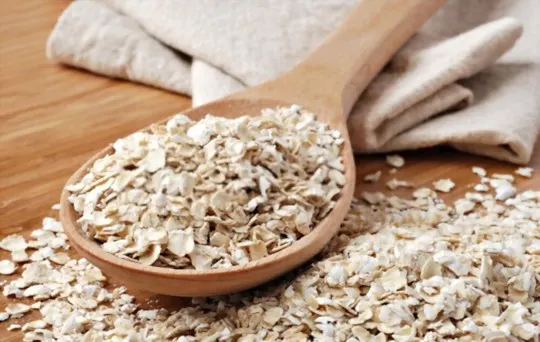
The 5 Best Substitutes for Old Fashioned Oats
Ingredients
- 1 – Quinoa Flakes
- 2 – Buckwheat
- 3 – Steel-cut Oats
- 4 – Amaranth
- 5 – Millet
Instructions
- Choose your preferred substitute from the list of options.
- Organize all of your ingredients.
- Use the proper substitute to cook your recipes.
